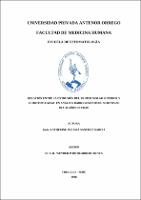Relación entre la extrusión del primer molar superior y el biotipo facial en análisis radiográficos de sujetos de 18 a 30 años de edad

Ver/
Descargar
(application/pdf: 779.2Kb)
(application/pdf: 779.2Kb)
Fecha
2018Autor(es)
Sánchez García, Katherine Melissa
Metadatos
Mostrar el registro completo del ítemResumen
El presente estudio tuvo como objetivo determinar si existe relación entre la
extrusión del primer molar superior y el biotipo facial en sujetos de 18 a 30 años de
edad.
El estudio retrospectivo, transversal, descriptivo y observacional. El trabajo se
realizó en un centro radiológico de Trujillo e incluyó un total de 140 radiografías
de sujetos entre 18 y 30 años de edad. Para evaluar la extrusión del primera molar
superior se trazó una línea perpendicular al plano palatino que se extiende desde el
plano palatino hasta la punta de la cúspide mesial del primer molar superior y el
biotipo facial se evaluó a través del plano mandibular (línea Go-Me a SN)
clasificándose a los pacientes en caras largas (>35°), caras promedio (30°-35°) o
caras cortas (< 30°). Para el análisis estadístico de la relación entre la extrusión del
primer molar superior y el biotipo facial en análisis radiográficos de sujetos de 18
a 30 años se empleó el coeficiente de correlación de Spearman, estimación puntual
e interválica. Se consideró agrupación según sexo y edad. Se consideró un nivel de
significancia del 5%.
Como resultado obtuvimos una significancia de P > 0.05 entre la relación de la
extrusión del primer molar superior y el biotipo facial, concluyendo que no existe
relación alguna entre la extrusión del primer molar superior y el biotipo facial. This thesis aims to determine whether there is a relationship between the extrusion
of the first upper molar and the facial biotype in subjects between 18 and 30 years
olds.
The study is retrospective, cross-sectional, descriptive and observational. It was
carried out in a radiological center in Trujillo and included 140 radiographs of
subjects between 18 and 30 years old. In order to measure the extrusion of the first
maxillary molar, a perpendicular line to the palatal plane was drawn that extends
from the palatal plane to the tip of the mesial cusp of the upper first molar and to
measure the facial biotype, it was used the mandibular plane (Go-Me-Sn line).
Patients were classified into long faces (> 35 °), average faces (30 ° -35 °) or short
faces (<29 °). For the statistical analysis of the relationship between the extrusion
of the first upper molar and the facial biotype in radiographic analyzes of subjects
aged 18 to 30 years old, I used Spearman ratio coefficient, point and interval
estimation. Also I consider to groups according to sex and age and a level of
significance of 5%.
I found that there is not a significant difference (P> 0.05) between the relation of
the extrusion of the first upper molar and the facial biotype in subjects from 18 to
30 years old, so there is no relationship between these two variables.
Palabras clave
Colecciones
- Estomatología [653]

